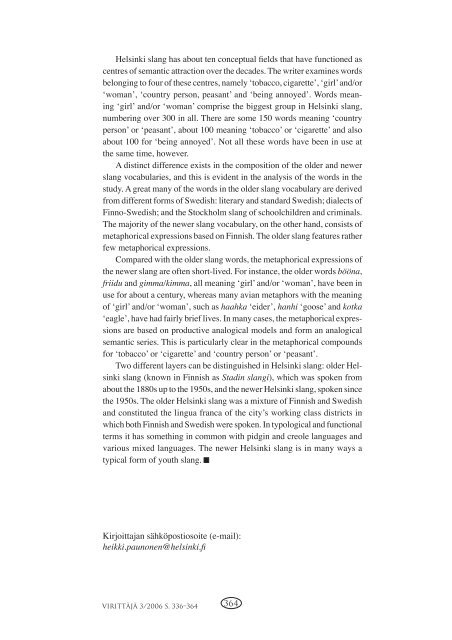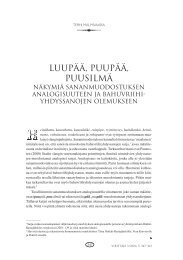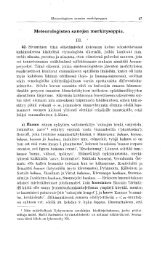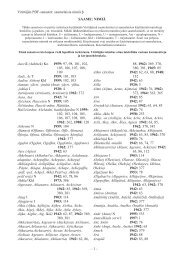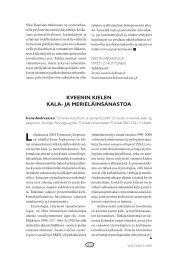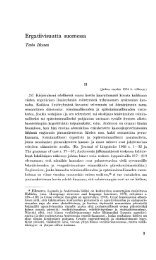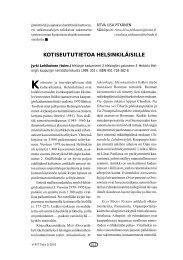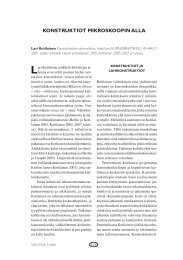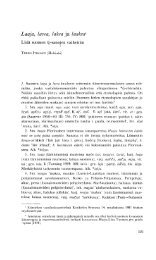Synonymia Helsingin slangissa - Kotikielen Seura ja Virittäjä
Synonymia Helsingin slangissa - Kotikielen Seura ja Virittäjä
Synonymia Helsingin slangissa - Kotikielen Seura ja Virittäjä
You also want an ePaper? Increase the reach of your titles
YUMPU automatically turns print PDFs into web optimized ePapers that Google loves.
Helsinki slang has about ten conceptual fi elds that have functioned as<br />
centres of semantic attraction over the decades. The writer examines words<br />
belonging to four of these centres, namely ʻtobacco, cigaretteʼ, ʻgirlʼ and/or<br />
ʻwomanʼ, ʻcountry person, peasantʼ and ʻbeing annoyedʼ. Words meaning<br />
ʻgirlʼ and/or ʻwomanʼ comprise the biggest group in Helsinki slang,<br />
numbering over 300 in all. There are some 150 words meaning ʻcountry<br />
personʼ or ʻpeasantʼ, about 100 meaning ʻtobaccoʼ or ʻcigaretteʼ and also<br />
about 100 for ʻbeing annoyedʼ. Not all these words have been in use at<br />
the same time, however.<br />
A distinct difference exists in the composition of the older and newer<br />
slang vocabularies, and this is evident in the analysis of the words in the<br />
study. A great many of the words in the older slang vocabulary are derived<br />
from different forms of Swedish: literary and standard Swedish; dialects of<br />
Finno-Swedish; and the Stockholm slang of schoolchildren and criminals.<br />
The majority of the newer slang vocabulary, on the other hand, consists of<br />
metaphorical expressions based on Finnish. The older slang features rather<br />
few metaphorical expressions.<br />
Compared with the older slang words, the metaphorical expressions of<br />
the newer slang are often short-lived. For instance, the older words bööna,<br />
friidu and gimma/kimma, all meaning ʻgirlʼ and/or ʻwomanʼ, have been in<br />
use for about a century, whereas many avian metaphors with the meaning<br />
of ʻgirlʼ and/or ʻwomanʼ, such as haahka ʻeiderʼ, hanhi ʻgooseʼ and kotka<br />
ʻeagleʼ, have had fairly brief lives. In many cases, the metaphorical expressions<br />
are based on productive analogical models and form an analogical<br />
semantic series. This is particularly clear in the metaphorical compounds<br />
for ʻtobaccoʼ or ʻcigaretteʼ and ʻcountry personʼ or ʻpeasantʼ.<br />
Two different layers can be distinguished in Helsinki slang: older Helsinki<br />
slang (known in Finnish as Stadin slangi), which was spoken from<br />
about the 1880s up to the 1950s, and the newer Helsinki slang, spoken since<br />
the 1950s. The older Helsinki slang was a mixture of Finnish and Swedish<br />
and constituted the lingua franca of the cityʼs working class districts in<br />
which both Finnish and Swedish were spoken. In typological and functional<br />
terms it has something in common with pidgin and creole languages and<br />
various mixed languages. The newer Helsinki slang is in many ways a<br />
typical form of youth slang.<br />
Kirjoitta<strong>ja</strong>n sähköpostiosoite (e-mail):<br />
heikki.paunonen@helsinki.fi<br />
VIRITTÄJÄ 3/2006 S. 336–364<br />
364


